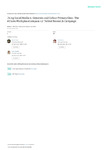Using Social Media to Generate and Collect Primary Data: The #ShowsWorkplaceCompassion Twitter Research Campaign
| dc.contributor.author | Clyne, Wendy | |
| dc.contributor.author | Pezaro, Sally | |
| dc.contributor.author | Deeny, Karen | |
| dc.contributor.author | Kneafsey, Rosie | |
| dc.date.accessioned | 2020-09-15T08:32:28Z | |
| dc.date.available | 2020-09-15T08:32:28Z | |
| dc.date.issued | 2018 | |
| dc.identifier.issn | 2369-2960 | |
| dc.identifier.issn | 2369-2960 | |
| dc.identifier.other | ARTN e41 | |
| dc.identifier.uri | http://hdl.handle.net/10026.1/16289 | |
| dc.description.abstract |
BACKGROUND: Compassion is a core value embedded in the concept of quality in healthcare. The need for compassion toward healthcare staff in the workplace, for their own health and well-being and also to enable staff to deliver compassionate care for patients, is increasingly understood. However, we do not currently know how healthcare staff understand and characterize compassion toward themselves as opposed to patients. OBJECTIVE: The aim of this study was to use social media for the generation and collection of primary data to gain understanding of the concept of workplace compassion. METHODS: Tweets that contained the hashtag #ShowsWorkplaceCompassion were collected from Twitter and analyzed. The study took place between April 21 and May 21, 2016. Participants were self-selecting users of the social media service Twitter. The study was promoted by a number of routes: the National Health Service (NHS) England website, the personal Twitter accounts of the research team, internal NHS England communications, and via social media sharing. Participants were asked to contribute their views about what activities, actions, policies, philosophies or approaches demonstrate workplace compassion in healthcare using the hashtag #ShowsWorkplaceCompassion. All tweets including the research hashtag #ShowsWorkplaceCompassion were extracted from Twitter and studied using content analysis. Data concerning the frequency, nature, origin, and location of Web-based engagement with the research campaign were collected using Bitly (Bitly, Inc, USA) and Symplur (Symplur LLC, USA) software. RESULTS: A total of 260 tweets were analyzed. Of the 251 statements within the tweets that were coded, 37.8% (95/251) of the statements concerned Leadership and Management aspects of workplace compassion, 29.5% (74/251) were grouped under the theme related to Values and Culture, 17.5% (44/251) of the statements related to Personalized Policies and Procedures that support workplace compassion, and 15.2% (38/251) of the statements concerned Activities and Actions that show workplace compassion. Content analysis showed that small acts of kindness, an embedded organizational culture of caring for one another, and recognition of the emotional and physical impact of healthcare work were the most frequently mentioned characteristics of workplace compassion in healthcare. CONCLUSIONS: This study presents a new and innovative research approach using Twitter. Although previous research has analyzed the nature and pattern of tweets retrospectively, this study used Twitter to both recruit participants and collect primary data. | |
| dc.format.extent | e41-e41 | |
| dc.format.medium | Electronic | |
| dc.language | en | |
| dc.language.iso | eng | |
| dc.publisher | JMIR Publications Inc. | |
| dc.subject | work engagement | |
| dc.subject | health personnel | |
| dc.subject | empathy | |
| dc.subject | attitude of health personnel | |
| dc.title | Using Social Media to Generate and Collect Primary Data: The #ShowsWorkplaceCompassion Twitter Research Campaign | |
| dc.type | journal-article | |
| dc.type | Journal Article | |
| plymouth.author-url | https://www.webofscience.com/api/gateway?GWVersion=2&SrcApp=PARTNER_APP&SrcAuth=LinksAMR&KeyUT=WOS:000526815500011&DestLinkType=FullRecord&DestApp=ALL_WOS&UsrCustomerID=11bb513d99f797142bcfeffcc58ea008 | |
| plymouth.issue | 2 | |
| plymouth.volume | 4 | |
| plymouth.publication-status | Published online | |
| plymouth.journal | JMIR Public Health and Surveillance | |
| dc.identifier.doi | 10.2196/publichealth.7686 | |
| plymouth.organisational-group | /Plymouth | |
| plymouth.organisational-group | /Plymouth/Faculty of Health | |
| plymouth.organisational-group | /Plymouth/Faculty of Health/Peninsula Medical School | |
| plymouth.organisational-group | /Plymouth/REF 2021 Researchers by UoA | |
| plymouth.organisational-group | /Plymouth/REF 2021 Researchers by UoA/UoA03 Allied Health Professions, Dentistry, Nursing and Pharmacy | |
| plymouth.organisational-group | /Plymouth/Users by role | |
| plymouth.organisational-group | /Plymouth/Users by role/Academics | |
| dc.publisher.place | Canada | |
| dcterms.dateAccepted | 2018-02-28 | |
| dc.identifier.eissn | 2369-2960 | |
| dc.rights.embargoperiod | Not known | |
| rioxxterms.versionofrecord | 10.2196/publichealth.7686 | |
| rioxxterms.licenseref.uri | http://www.rioxx.net/licenses/all-rights-reserved | |
| rioxxterms.licenseref.startdate | 2018-04-23 | |
| rioxxterms.type | Journal Article/Review |


